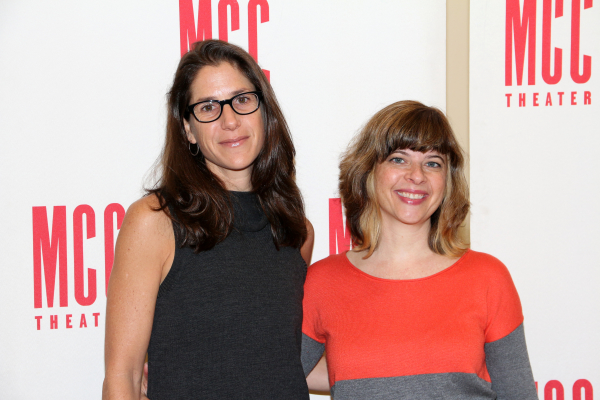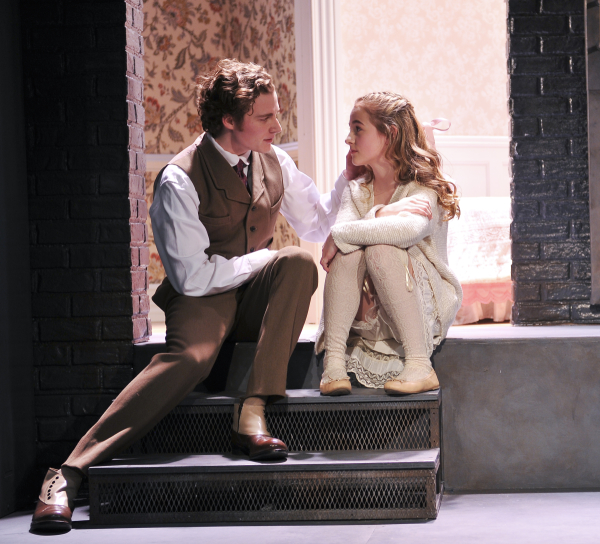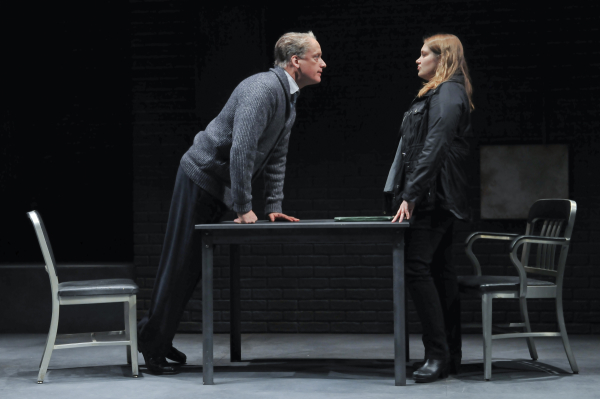Director Anne Kauffman on Building The Nether With Just a Little Theater Magic
In the futuristic world of Jennifer Haley’s new play, imagination is the most important set piece.
In The Nether, the world's most heinous crimes no longer have consequences. Moral law is inconsequential in this simulated online reality, where child predators can now log on to exercise their perversions in the safety of a fabricated universe.
Jennifer Haley's futuristic drama, now running at MCC's Lucille Lortel Theatre, opens on a detective (played by Merritt Wever) interrogating an older man named Sims (Frank Wood), who, under the pseudonym of "Papa," has created a virtual "Hideaway" in the "Nether" for just this depraved purpose. As director, Anne Kauffman takes on the tall task of not only visually translating these parallel universes to the stage, but depicting this sensitive scenario with thirteen-year-old Sophia Anne Caruso at the fulcrum of its disturbing implications.
In a sit-down with TheaterMania, Kauffman discussed how she maneuvered through these challenges, while also addressing the play's thought-provoking questions. For in an age where immersive technology and virtual experiences are becoming more and more entwined with the fabric of our society, The Nether broaches an ethical debate that may, in short order, move beyond the hypothetical.

(© David Gordon)
How did you approach staging a play that switches back and forth between reality and the Internet utopia of the "Hideaway"?
The temptation potentially is to go super high-tech with it. But it was important to me to maintain the fact that we're doing it in the theater. I think that's what's so exciting. That we're [creating] the vision of the future in a pretty archaic art form. The magic of the theater is a metaphor for transportation into another world. That's what the theater does.
What kind of aesthetic did that bring you to?
I really wanted the relationship between the interrogation room and the Hideaway to feel more porous — that [the Hideaway] is just beyond our reach. We open up these pockets [to give] you a glimpse rather than allowing the characters and the audience to be completely submerged in that world.
The play's premise is very much like an ethical thought experiment. Do you have any strong convictions yourself about whether or not unlawful activities should be permissible in this virtual "Nether"?
Jen Haley talks about a specific Japanese game — a sexualized game where you can take a mother and two children and rape them in front of each other. I feel like that should not be allowed. I'm not sure if violence in movies or on the Internet actually creates violence in the real world. Entertainment has been sexy or violent for forever — [since] Shakespeare. So I find it hard to make that correlation in any kind of grounded way. But that video game — I find it abhorrent. It offends my sensibilities. But if I went to court, I don't know if I could actually draw the line. I think that's what's so great about the piece. It doesn't come down on one side or the other. As a director, I'm mostly interested in keeping those questions up in the air.

(© Jenny Anderson)
Was it difficult directing your young actress, Sophia Anne Caruso, in a role that essentially paints her as a sexual object for older men?
I thought it was going to be. I arrived at auditions and I suddenly realized, Oh my God, I have to direct them to — what? Be suggestive? So I kind of had a little freak out. But I never had to actually say, "Be sexy," or anything like that. You don't need the language. The fact that she's a little girl takes care of it. In terms of Sophia Anne Caruso, she actually guided me. When she was auditioning for it, she was like, "I really want to sink my teeth into a worthy role. I'm tired of doing musicals. They just want me to go out on the stage and smile and dance. I just really want to show what I actually have." I started out being very cautious, not just with the sexuality of it, but even just learning how to talk to her as an actress. It became very clear that I could just talk to her like I talked to the rest of the cast. She may be the most professional person in the company. Including me. [laughs] She's extraordinary.
How do you portray the sexual content of the play without crossing a line onstage?
There is nothing explicit. We know what it's about, so we interpret all of that. That's the glory of this play. You don't have to show a lot of anything, including the Hideaway. I wanted the audience to project their imagination. [I] give them a little bit, and they create the rest of it. I think that's the same thing that's happening with her and those relationships.
How do you hope audiences come away from The Nether?
With a lot of questions. Because I feel like this world is so imminent. If I had to give a year that this play was taking place in, I would say it's probably within fifty years from now. There's already more stuff where you can actually be inside of something and it's 3-D and it's from your perspective, [like] Second Life. It's conceivably not that far away. One of the lines that I think is so incredible in the play is, "There is a line even in your imagination." I would hope that people are debating this as we get further and further along in developing what the Internet can do.

(© Jenny Anderson)








